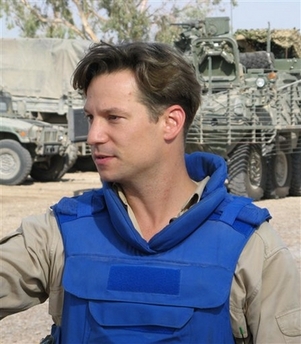Networks showcase Iraq correspondents
(AP)Updated: 2007-03-19 10:50
NEW YORK - During his four years in Iraq, NBC News correspondent Richard Engel has escaped two attempted carjackings and a roadside bomb. Another bomb blew the door off his hotel room, sending shrapnel that burned holes through the sheets of the bed where he was sleeping.
 This 2006 photo, released by NBC News, shows correspondent Richard Engel at Camp Striker in Iraq. Engel reports from Iraq in the NBC special 'War Zone Diary,' which premieres Wednesday on MSNBC. [AP]  |
Both NBC and ABC this week are showcasing the work of two correspondents - Engel and Terry McCarthy - who have covered most of the war.
Engel's "War Zone Diary" premieres 10 p.m. EDT Wednesday on MSNBC. It's a personal look at his experiences, filmed mostly on the small camera he took to Baghdad as a freelancer before the US invasion.
McCarthy is the lead reporter for the "Iraq: Where Things Stand" series, which will be featured on all of ABC's newscasts this week. He traveled around the country (as much as he could) to talk to Iraqis about their lives.
The reporters' own lives in Iraq are filled with constant safety concerns and frustration that the danger restricts their work, mixed with the exhilaration of covering the biggest story in the world.
"When we decide to do stories our first consideration is, 'Is it safe to go there?', and our second consideration is, 'Is it a newsworthy story?', which I hate," McCarthy told The Associated Press by phone from Iraq. "But that's just the reality of working here."
McCarthy, 45, covered the war for Time magazine before joining ABC News in June. He's married with two children younger than 3, and his assignment regularly gives him six weeks in Iraq and three weeks home in Los Angeles. Engel is 33 and childless, with a divorce caused in part by his preoccupation with covering the Middle East since he graduated from Stanford 11 years ago.
Engel's career took off when he stayed in Baghdad at a time many networks pulled correspondents in anticipation of the American invasion.
He recorded many of those moments for his diary, trying to capture the sense of paranoia while waiting for war and the realization he was truly alone. At one point, Engel muses about filming material for his own obituary.
His most recent close call was a month ago. He was riding with a military unit past a field strewn with garbage and, often, dead bodies. The driver swerved defensively just as a bomb was detonated. Engel's only injuries were a headache and sore back.
One of the near carjackings scared him the most. In Baghdad traffic, cars suddenly pulled in front of and behind his. Engel's driver instantly recognized what was happening, turned and jumped a concrete median. He tore away at 80 mph, dodging oncoming cars.
"Sometimes, what's most frightening is the down time, when you think, 'It's been four years now; how often can you press your luck?'" he said. "At some stage if I keep doing this, and I plan on keeping doing this, I'll have to be fairly cautious and fairly lucky to walk away from this without getting hurt or worse."
Every trip out of the office for an interview requires a checklist of considerations, including escape routes. "You want to move in, do what you need to do and get out before anyone knows you were there," he said.
If you try to avoid every dangerous situation, "you might as well not be there," Engel said, while conceding the lifestyle has a certain addictive quality.
McCarthy keeps his worst moments to himself.
"There have been bullets that have come way too close to me," he said, "but I don't like to talk about that too much. There is nowhere that is safe here. We do our best to protect ourselves."
He had to abruptly leave one Baghdad neighborhood
recently after a half-hour when a security guard noticed someone writing down
the license number of his car.
| 1 | 2 |  |
|
||
|
||
|
|